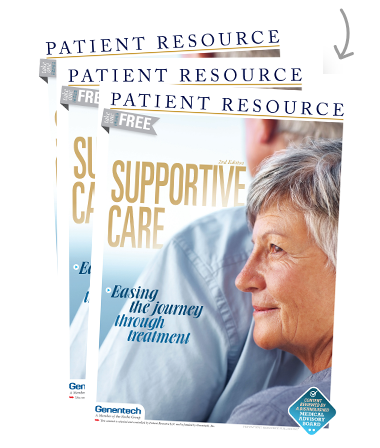Depression
Don’t ignore your emotional health
Depression is a disorder consisting primarily of a depressed mood and loss of interest or pleasure in normal activities. More complex than feeling sad or hopeless, a diagnosis of depression requires that at least five of the following symptoms occurred every day for at least two weeks:
- Persistent sad, anxious or “numb” feeling
- Loss of interest or pleasure in hobbies and activities that you once enjoyed
- Feelings of hopelessness
- Feelings of guilt, worthlessness, helplessness
- Fatigue and loss of energy
- Difficulty concentrating, remembering, making decisions
- Sleep problems
- Changes in appetite and/or weight
- Thoughts of death or suicide or suicide attempts
- Restlessness, irritability
- Social withdrawal
- Repeated episodes of crying
Diagnosing depression in people with cancer is a challenge because many of these symptoms are side effects of cancer and/or its treatment. Many people with cancer who have depression do not talk to their doctor or nurse because they think that depression is “expected.” This is not true. Depression can and should be treated. Most cases of depression are related to the cancer experience on the whole, but depression can be related to cancer treatments, particularly if your treatment included interferon or steroids.
Why does depression occur?
Depression is most often a psychological reaction, and among people with cancer, it may occur as a reaction to multiple side effects of cancer and its treatment. As a side effect of medication or the result of low hormones, depression is a physical reaction resulting from chemical imbalances in the brain – specifically, decreases in the levels of serotonin and norepinephrine, chemicals that regulate moods.
Who is most likely to be affected by depression?
Studies have shown that depression (or mood changes) is a possible side effect of some chemotherapy drugs and other anti-cancer agents, and people with cancer who take these drugs are most likely to be affected. People who receive treatment that results in low levels of hormones (removal or damage to ovaries or testicles) are also likely to be affected by depression as are those with a history of depression or of alcohol or drug abuse (before the cancer diagnosis). The more unrelieved cancer-related symptoms you have, the greater the risk for depression. Uncontrolled pain is one of the primary contributors to depression.
When does depression occur?
Depression can occur at any time during cancer treatment, but it is most likely to occur during times of unrelieved side effects of treatment.
How is depression managed?
If other symptoms appear to be the cause of depression, treatment to alleviate those symptoms is a priority. People with milder forms of depression may find benefit from counseling alone (without medications). Moderate or severe depression is typically managed with a combination of psychologic treatment and medication (antidepressants). Psychologic treatment may include individual psychotherapy (counseling to explore emotional issues that contribute to depression) and cognitive-behavioral therapy (counseling to help a person change his or her negative thought patterns and behaviors). Cancer support groups may also be helpful as well as a range of complementary therapies such as meditation and art therapy.
Many antidepressants are available. The antidepressants used most often for people with cancer belong to a class known as selective serotonin reuptake inhibitors (SSRIs).
Tricyclic antidepressants are also used, although they have more side effects than the SSRIs.
Another class of drugs, known as psychostimulants, has also shown some promise in the treatment of depression. A psychostimulant is sometimes given on its own and sometimes combined with another type of antidepressant drug.
Each antidepressant drug has different side effects. Your doctor can usually manage the side effects by adjusting the dose or switching the medication. Your doctor will work with you to find the antidepressant that works best for you with minimal side effects. Antidepressants do not take effect right away and may take two to six weeks before becoming effective.
Exercise, stress-relieving strategies (such as deep-breathing exercises and imagery) and support from family and friends can help you cope better with daily life with cancer and perhaps reduce the risk of depression.
Sitting at home and thinking about cancer all day is bad for your mental health. Maintain your normal routine as much as possible because normalcy helps reduce depression. Even if your life was chaotic before your diagnosis, that was normal for you. Working during treatment whenever possible has shown to help prevent depression, reduce risk of financial issues by keeping your paycheck whole and your health insurance intact, and much of your support system is likely among the people you work with day to day. There will of course be some periods of time that work may not be possible, depending on the type of work you do. However, for the majority of people, working at least part time reduces stress by helping you feel productive, as well as maintain contact with coworkers and keep busy in general.
When should I talk to my doctor about depression?
You should talk to your doctor about the possibility of depression occurring as a side effect of your prescribed cancer treatment. Call your doctor’s office if you have five or more symptoms of depression that last for two weeks or feel emotions that interfere with daily activities for more than a few days.
Call your doctor immediately if you:
- Have thoughts of suicide
- Are unable to eat or sleep
- Are severely restless



